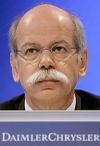Perfect Pitch People

Not an easy question to answer. It’s a move that can either lead to fame and fortune or embarrassment and ridicule. Dave Thomas is an example of the former and Dr. Z of the latter.
To help your company decide if your top person has the chops, I have put together a check list. How does your CEO score on the following criteria?
1. Authenticity. Does this person have an authentic link to the company? Is he or she widely known to be the leader? Founders, namesakes and longtime leaders have this built in. Michael Dell and Orville Redenbacher, for example. Bill Ford had the name but not the reputation as a leader.
2. Likability. Some people are instantly likable. Dave Thomas, Papa John or Lee Iaccoca, for example, are very likable. Dry and cold Jacques Nasser is not very likable.
3. Screen presence. Being likable in person and translating your likability onto the screen are two different things. A CEO needs to be natural, honest, and charismatic in front of rolling cameras. A little acting skill is also handy. Scott Blum of Buy.com has little on-screen presence or personality. Donald Trump seems to glow on screen.
4. Well-known. Is your CEO a household name already? Has he or she done enough PR so that the CEO is familiar to a wide audience? Dieter Zetsche was not widely known, especially as Dr. Z. In fact, most consumers assumed Dr. Z was an actor and not the actual chief executive.
5. Story. What is the CEO going to do and say in the television commercial? Is there a reasonable story that he or she has to tell? Frank Perdue talking marigolds was a great story. Or George Zimmer of the Men’s Wearhouse guaranteeing I will love the way I look also works.
Using the company CEO in the advertising is typically used for one of two reasons. One is that the company is in real trouble and putting the leader on television can repair confidence in the corporation. (By some it is seen as a desperation move.) It can either work wonderfully as with Iaccoca or miserably as with Dr. Z.

The truth is that all companies need a spokesperson, one key player that can be the voice of the company and/or brand. But the main avenue of communication for the spokesperson should be PR. There are many potential PR opportunities especially if the brand is first in a new category. Dell was the first to sell computers direct. Papa John was the first to sell pizza with better ingredients. Being first and using PR are how you build brands.
But in the case of well-known brands in mature categories where advertising plays an important role in the maintenance and defense of a brand, it can make sense to also use the CEO as spokesperson in the advertising.
However, it does work better when there is enough advance PR build-up to give the CEO credibility, experience and authenticity. In fact there are many high-profile CEOs who probably should have stepped in the role of pitch person for their brands.

Going Hollywood is not for all CEOs; it takes a special combination of talents, skills and circumstance to really pull it off. And not pulling it off can be detrimental to your brand, not to mention your CEO’s ego.
 ?>
?>